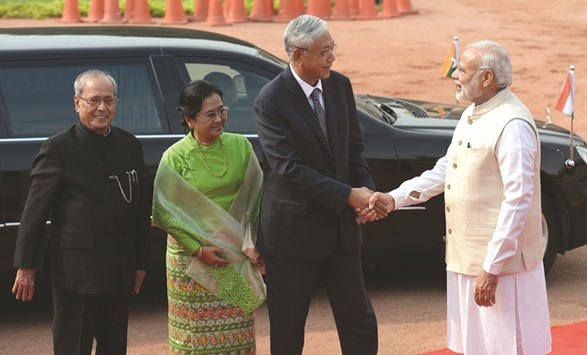Prime Minister Narendra Modi yesterday assured Myanmar, which has newly attained democracy, that India will stand by it every step of the way in its bid to develop as a modern nation even as both sides agreed to cooperate in the fight against terrorism and insurgency in the region.
“Your great nation has entered a new era,” Modi said during a joint press conference with visiting Myanmar President U Htin Kyaw following bilateral talks between the two sides.
“An era defined by maturity of your leadership and commitment of your people to democracy,” he said.
“And, which is accompanied by a clear vision and a strong desire of your leadership to make Myanmar a stable and economically prosperous country in the region.”
This is the first presidential visit from Myanmar after Nobel laureate Aung San Suu Kyi’s National League for Democracy (NLD) assumed power in March this year after its historic victory in the general elections in November last year.
Modi said that as the new government of Myanmar started its journey to grow its agriculture, develop its industry and infrastructure, strengthen its education, skill its youth, build new institutions and strengthen existing ones, secure its society, seek a firm path to economic prosperity and pursue an ambition to build a modern nation, “every step of the way, 1.25bn people of India will stand by you — both as partners and as friends”.
Observing that Myanmar held a unique position in India’s neighbourhood, he said: “It is a land bridge that connects India with southeast Asia.”
Modi said that during his talks with President U Htin Kyaw, both sides discussed the whole range of bilateral engagement.
He said both sides agreed on the need to remain sensitive to each other’s strategic interests and concerns.
“To this end, the president and I agreed to work together for the safety and security of our people,” he said.
“And, actively cooperate to combat the common challenges of terrorism and insurgent activity in our region.”
During External Affairs Minister Sushma Swaraj’s daylong visit to Nay Pyi Taw on August 22, the leadership of the eastern neighbour assured that it would not allow Indian insurgent groups to operate from Myanmar territory.
On August 19, a heavy exchange of fire took place between the Indian Army and the National Socialist Council of Nagaland-Khaplang (NSCN-K) insurgents after the soldiers raided some villages in Mon district of Nagaland along the India-Myanmar border.
India yesterday also conveyed its full support to the peace initiative under the “21st Century Panglong Conference” between the Myanmar government and ethnic armed organisations scheduled from August 31.
The first Panglong conference was convened by Suu Kyi’s father and then-Myanmar premier Aung San in 1947.
Modi said India-Myanmar partnership was defined not just by good words and pure intent.
“Its extent and depth is shaped by a robust development cooperation partnership, which has a strong ‘people first’ philosophy,” he said.
“India’s nearly $2bn development assistance is touching the lives of the common man of Myanmar.
“Our engagement is supporting projects in connectivity, infrastructure, capacity-building education, healthcare and many other sectors.”
Following the bilateral talks, India and Myanmar on Monday signed four agreements.
The first agreement pertains to construction of 69 bridges on the Tamu-Kalewa section of the trilateral highway connecting India, Myanmar and Thailand.
The second agreement is on upgrading the Kalewa-Yargi section of the trilateral highway.
The third agreement is on cooperation in the field of renewable energy, while the fourth agreement is on co-operation in the field of traditional medicine.
Apart from this, Modi said that some other concrete examples of the two countries’ partnership included the Kaladan multi-modal transport project connecting Mizoram with Sittwe port in Myanmar, the Myanmar Institute of Information Technology, the Advanced Centre of Agricultural Research and Education and smaller projects in health, education and industrial training sector.
“We have also agreed to work towards a long-term and a mutually beneficial arrangement for trade in pulses,” the prime minister said.
Pointing out that power supply to Tamu in Myanmar commenced in April this year, Modi said India was ready to substantially scale up electricity generation to its eastern neighbour.
“We are also ready to restore other historic monuments and pagodas, which were damaged in the earthquake which hit Myanmar just last week,” he said.
President U Htin Kyaw said both sides agreed to bring about overall socio-economic development of the people.
On a four-day visit to India, U Htin Kyaw was in Bodh Gaya in Bihar on Saturday and later visited the Taj Mahal in Agra on Sunday.

Prime Minister Narendra Modi shakes hands with Myanmar President U Htin Kyaw as his wife Daw Su Su Lwi and President Pranab Mukherjee look on during a ceremonial reception in New Delhi yesterday.
